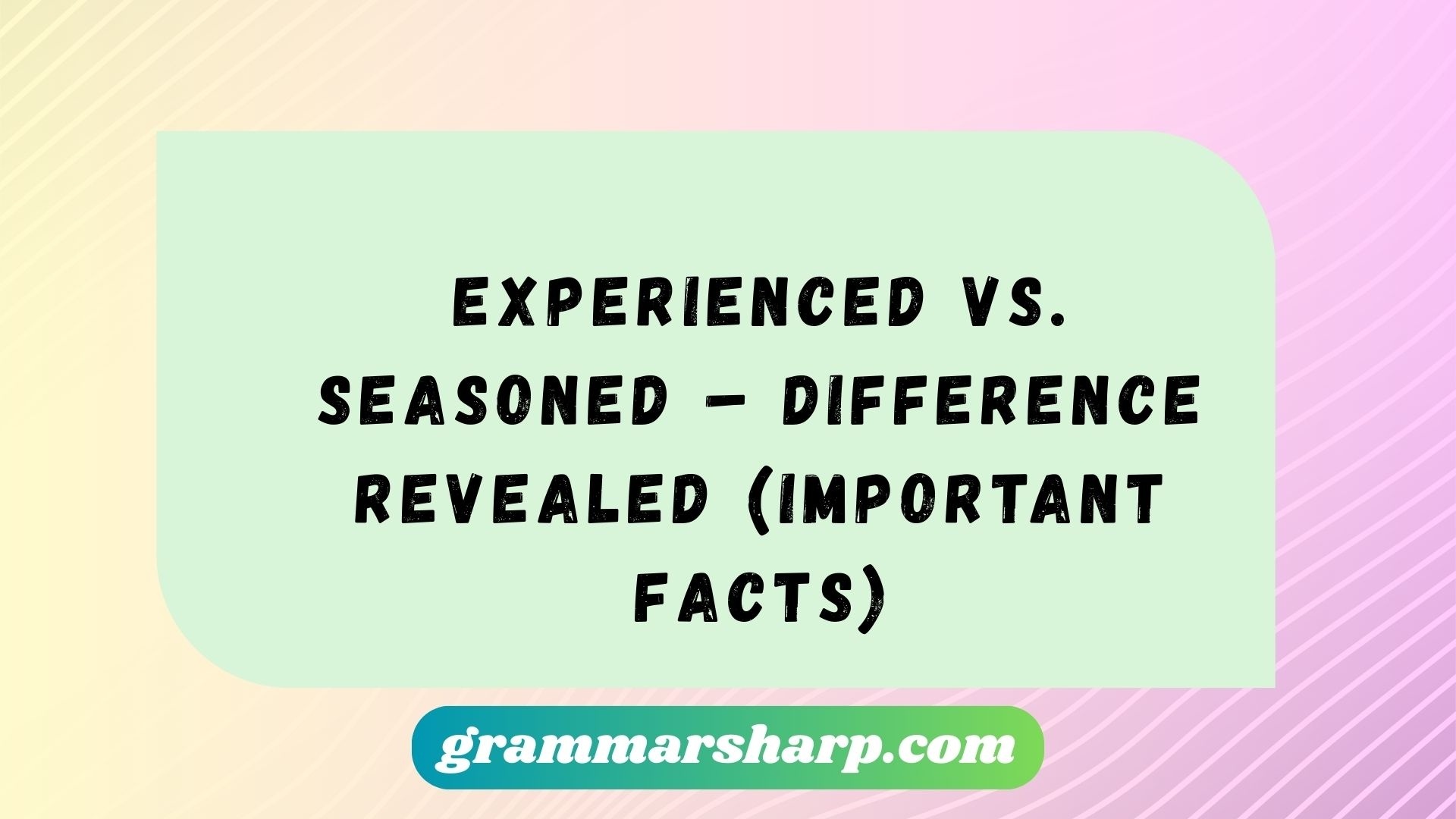Language shapes the way people see us. One word can subtly shift how others judge our expertise, authority, or credibility. Among such words, experienced and seasoned often confuse writers and speakers alike. Both suggest knowledge and skill, yet they carry different weights and nuances. Choosing the right one can make your resume stronger, your conversation sharper, and your message more precise.
Think about a job interview. If you describe yourself as experienced, you highlight the fact that you’ve spent time in the field and handled real tasks. If you call yourself seasoned, you emphasize wisdom gained through years of practice, challenges, and refinement. Both are positive terms, but they don’t always fit the same context.
This difference doesn’t just matter for resumes. It plays a role in everyday conversations, business writing, and even marketing. A seasoned traveler, for instance, paints a picture of someone worldly and savvy. An experienced traveler, however, suggests someone who has taken many trips and knows the basics.
In this article, we’ll break down the meanings of both words, compare them side by side, and provide clear examples so you know when to use each one. You’ll also discover common misconceptions, professional use cases, and practical tips for making the right choice. By the end, you’ll understand the subtle yet important difference between experienced and seasoned—and you’ll be able to apply this knowledge to stand out in any setting.
Quick Answer: What’s the Difference?
The word experienced refers to someone who has done something many times and learned from it. It focuses on exposure, participation, and practice.
The word seasoned goes a step further. It describes someone whose experiences have refined their abilities, judgment, and maturity. A seasoned person isn’t just knowledgeable—they’ve been tested, polished, and proven over time.
Here’s a simple comparison:
| Term | Core Meaning | Connotation | Example Use |
| Experienced | Has practical knowledge from doing something | Neutral, factual | “She’s experienced in digital marketing.” |
| Seasoned | Has deep, refined knowledge shaped by years of practice | Strong, authoritative | “He’s a seasoned business leader.” |
What Does “Experienced” Mean?

The word experienced comes from the Latin experiri, meaning “to try” or “to test.” Over time, it evolved into a word describing people who have gained knowledge through direct involvement.
When you say someone is experienced, you highlight their exposure to situations. They’ve practiced enough to know how things work, though not necessarily at the highest level of refinement.
Examples of “Experienced” in Daily Life
- An experienced teacher has taught many classes and understands student needs.
- An experienced driver knows how to handle traffic but may not be a professional racer.
- An experienced employee has handled projects and workplace challenges.
Strengths of Being Experienced
- Shows credibility in a field.
- Implies you’ve made mistakes and learned from them.
- Suggests confidence in handling recurring tasks.
In short, being experienced signals practical ability and readiness. It doesn’t always carry the deeper wisdom or authority of being seasoned, but it’s still a powerful descriptor.
What Does “Seasoned” Mean?
The word seasoned has roots in the idea of seasoning food—adding spices to make it flavorful. Over time, it became a metaphor for people whose skills have been “seasoned” or enriched by time and challenges.
When you call someone seasoned, you imply more than exposure. You suggest maturity, judgment, and depth that only come after years of refining their craft.
Examples of “Seasoned” in Daily Life
- A seasoned chef not only knows recipes but understands flavors intuitively.
- A seasoned lawyer has argued in court for decades and knows how to sway a jury.
- A seasoned traveler doesn’t just visit new places; they navigate cultures with ease.
Advantages of Being Seasoned
- Implies mastery and wisdom.
- Signals resilience under pressure.
- Suggests credibility, authority, and leadership.
Calling someone seasoned paints them as battle-tested and polished, not just capable.
Experienced vs. Seasoned: Key Differences
Although similar, the two terms differ in subtle but important ways.
Depth vs. Breadth
- Experienced suggests someone has seen a lot, but depth can vary.
- Seasoned implies they’ve not only seen a lot but also learned deep lessons.
Time Factor
- Experience can be gained quickly through repeated practice.
- Seasoning usually takes years—it implies longevity and refinement.
Situational Use
- Use experienced to highlight practical exposure.
- Use seasoned to emphasize authority and wisdom.
Here’s a side-by-side breakdown:
| Feature | Experienced | Seasoned |
| Focus | Exposure & practice | Wisdom & refinement |
| Time Required | Short to medium | Long-term |
| Tone | Neutral, factual | Respectful, authoritative |
| Example | “Experienced accountant” | “Seasoned financial strategist” |
When to Use “Experienced” vs. “Seasoned”

Choosing between these words depends on tone, context, and audience.
- Resumes & Job Applications
- Use experienced if you’re early or mid-career and want to show practical exposure.
- Use seasoned if you’re highlighting decades of achievement and leadership.
- Professional Bios & Introductions
- A consultant may call themselves seasoned to show credibility.
- A junior analyst may prefer experienced to avoid overstatement.
- Everyday Conversations
- Saying “experienced in cooking” sounds modest and straightforward.
- Saying “seasoned cook” sounds more artistic and refined.
Sample Sentences
- Correct: “She is an experienced project manager with five years in IT.”
- Correct: “He is a seasoned negotiator known for closing high-stakes deals.”
The trick is to match the word with the depth of skill you want to highlight.
Common Misconceptions
Many people confuse the two words or use them interchangeably. Let’s clear that up:
- Misconception 1: Experienced always means old.
False. A 25-year-old can be an experienced software developer. - Misconception 2: Seasoned always means better.
Not always. Some seasoned professionals resist change, while younger experienced ones adapt quickly. - Misconception 3: They are interchangeable.
Wrong. The wrong choice can misrepresent your skill level.
Context and precision matter. The right word shapes how others perceive your credibility.
Usage in Different Fields
Both words appear across industries, but their nuances change.
Business and Corporate Settings
- Experienced: “Experienced in project management software.”
- Seasoned: “Seasoned executive leading multinational teams.”
Education and Training
- Experienced: “An experienced math tutor for high school students.”
- Seasoned: “A seasoned professor with decades of published research.”
Arts and Creative Industries
- Experienced: “Experienced in graphic design tools.
- Seasoned: “A seasoned artist with exhibitions worldwide.”
Sports and Coaching
- Experienced: “An experienced athlete in local competitions.”
- Seasoned: “A seasoned coach who has led teams to championships.”
These examples show how the right choice enhances clarity.
Synonyms and Alternatives
When writing, you may need alternatives to avoid repetition.
Alternatives to Experienced
- Skilled
- Practiced
- Trained
- Proficient
Alternative to Seasoned
- Veteran
- Accomplished
- Expert
- Masterful
Tip: Use synonyms carefully. Some, like veteran, carry strong associations with military or long service, so make sure the context fits.
Final Thoughts & Takeaways
Both experienced and seasoned are powerful words. The difference lies in nuance.
- Use experienced when you want to highlight practical exposure and capability.
- Use seasoned when you want to emphasize wisdom, authority, and refinement.
Choosing the right word makes your communication sharper, your resume stronger, and your message more impactful. Precision in language isn’t just about grammar—it’s about influence.
FAQs
Can someone be experienced but not seasoned?
Yes. You can be experienced after a few years of practice, but being seasoned usually requires decades of growth and refinement.
Is “seasoned professional” better on a resume?
It depends. For senior roles, seasoned conveys authority. For entry or mid-level positions, experienced may feel more accurate.
Which is more formal: experienced or seasoned?
Seasoned often sounds more formal and authoritative. Experienced is more neutral and widely used.
Does “seasoned” always imply age?
Not necessarily. It implies time-tested wisdom, which often—but not always—comes with age.
Are both words interchangeable?
No. They overlap but carry different tones. Choose carefully based on your message.

